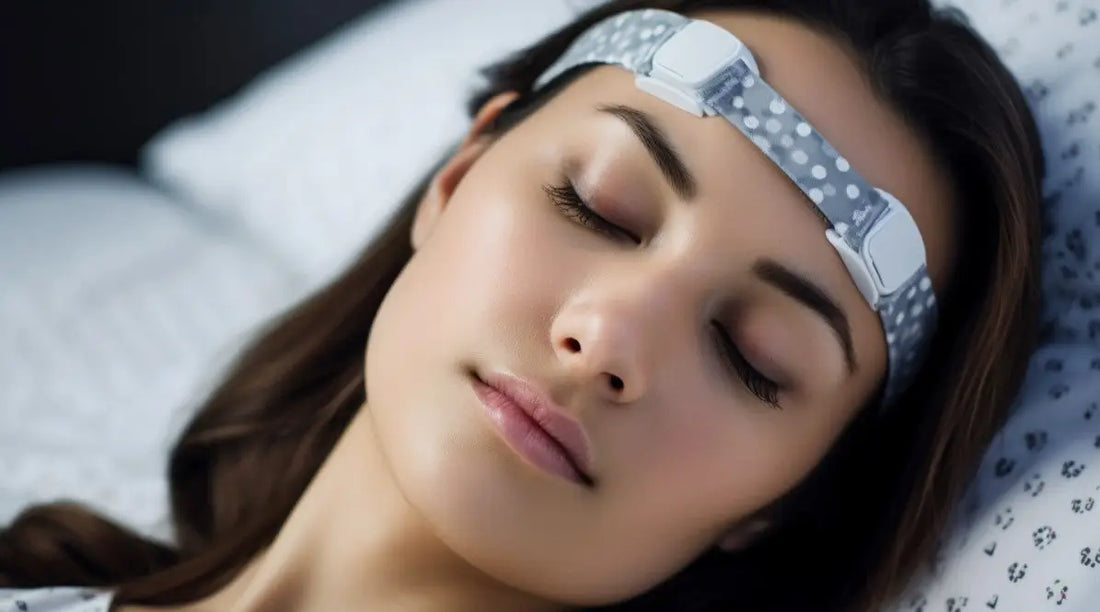
Understanding and treating sleep apnea for peaceful nights
Share
Sleep apnea: a nocturnal enigma disrupting your daily life
Sleep apnea, much more than just snoring, is a disorder that can disrupt the lives of those who suffer from it. Like a thief in the night, it silently robs people of their restful sleep, leaving them exhausted and stressed when they wake up. But what exactly is sleep apnea? And how can we recognize and treat it?
---
Summary : Sleep apnea is a nocturnal breathing disorder. Treatments and healthy habits can improve sleep quality.
---
What is sleep apnea?
Imagine yourself swimming in a pool. Everything is going well, until an invisible force suddenly pulls you down, stopping you from breathing. This is a bit like what people with sleep apnea feel every night.
Definition and types of apnea
Sleep apnea, also known as Obstructive Sleep Apnea–Hypopnea Syndrome (OSAS), is a disorder characterized by frequent interruptions of breathing during sleep. These interruptions, or “apneas,” can last 10 to 30 seconds and occur hundreds of times per night. It’s like someone is pressing the “pause” button on your repeated breathing.
Discover our range of supplements
dedicated to sleep!
Causes of sleep apnea
There are several factors that can contribute to sleep apnea. One of the most common culprits is being overweight. In fact, 70% of people with OSAHS are overweight. Obesity can lead to a buildup of fatty tissue around the airways, which can block them. Other factors include age, gender, and even the structure of your jaw or tongue. For example, a mandible that is too small or a large tongue can contribute to airway obstruction.
Symptoms of sleep apnea
If sleep apnea were a burglar, it would leave behind a series of telltale clues of its presence.
Nocturnal breathing pauses
Marie, a nurse from Montreal, says: "My husband always told me that I stopped breathing in my sleep. I thought he was exaggerating, until I recorded myself one night. It was terrifying to hear those long pauses followed by a loud gasp when I finally caught my breath.”
Nocturnal snoring and daytime sleepiness
Snoring may be the background noise in many bedrooms, but loud, irregular snoring can be a sign of sleep apnea. Additionally, feeling constantly tired during the day, despite getting a full night's sleep, is another clue. As the expression goes, “sleeping like a baby” doesn’t always mean rest.
Discover our range of supplements
dedicated to sleep!
Consequences on daily life
The impact of sleep apnea is not limited to the night. Daytime sleepiness, trouble concentrating, and even mood swings can all be signs of this disorder. Pierre, a taxi driver from Quebec, confides: "Before being diagnosed, I almost fell asleep at the wheel. It was scary."
In short, sleep apnea is a complex disorder that can have profound impacts on quality of life. The good news is that with adequate care, it is possible to return to peaceful and restorative nights. In the next part, we will explore the available treatments and preventive measures to manage this disorder. Stay tuned !
Medical Treatments for Sleep Apnea
Sleep apnea, although disturbing, is not inevitable. Fortunately, modern medicine offers a range of solutions to help those who suffer from it find peaceful sleep.
Continuous positive airway pressure (CPAP) machine
The continuous positive airway pressure, or CPAP, machine is often the first line of defense against sleep apnea. It's a bit like having a little wind constantly blowing through your airways to keep them open. The device consists of a mask, which can cover the nose or mouth, connected to a machine that provides a continuous flow of air. This prevents the airways from closing during sleep. For some, it's like a breath of fresh air, literally!
Discover our range of supplements
dedicated to sleep!
Mandibular advancement orthosis
For those who find the PPC cumbersome or uncomfortable, the mandibular advancement orthosis may be an interesting alternative. It is a device that resembles a dental splint and works by repositioning the lower jaw forward. This simple action helps keep the airways open. It's a bit like using a wedge to keep a door from closing.
Surgery
In some cases, when other treatments fail or are not appropriate, surgery may be considered. There are several procedures, ranging from airway surgery to maxillofacial surgery. It's a bit like renovating a house: sometimes you have to make structural adjustments to make everything work properly.
Prevention and tips for sleeping better
Beyond medical treatments, there are simple steps everyone can take to improve the quality of their sleep and prevent sleep apnea.
Hygiene of life and sleep
Sleep hygiene is essential. This means establishing a regular routine, avoiding caffeine and alcohol before bed, and creating an environment conducive to sleep. Think of your bedroom as a sanctuary: dark, calm and cool. And don't forget the importance of a good mattress and a comfortable pillow. It's like planting a garden: with the right conditions, anything can bloom.
Discover our range of supplements
dedicated to sleep!
Stress and anxiety management for better sleep
Stress and anxiety are often the enemies of sleep. Learning to manage them can make a huge difference in the quality of your sleep. Whether it's through meditation, yoga, or even a simple walk, finding what helps you relax is essential. As the saying goes, “a peaceful mind leads to a rested body.”
In short, sleep apnea is a complex disorder, but with the right information and tools, it is completely manageable. Whether you opt for medical treatment or implement lifestyle changes, the important thing is to take steps to improve your sleep and, in turn, your quality of life. After all, a good night's sleep is one of the most precious things we own.
Sleep apnea, although common, remains a serious disorder that can profoundly disrupt quality of life. Fortunately, with appropriate care, effective treatments and a better lifestyle, it is possible to return to peaceful and restorative nights. The key lies in understanding the problem and adopting solutions tailored to each individual.
Your questions and our answers about sleep apnea:
What is the difference between simple snoring and sleep apnea?
Snoring is a noise caused by tissue vibration, while sleep apnea involves interruptions in breathing during sleep.
Can sleep apnea be completely cured?
Although some treatments can significantly reduce symptoms, complete recovery depends on the underlying cause.
Can children have sleep apnea?
Yes, although less common in children, sleep apnea can occur, especially if they are overweight or have enlarged tonsils.
Can sleep apnea cause heart problems?
Yes, if left untreated, sleep apnea can increase the risk of heart problems such as hypertension and coronary heart disease.
Can losing weight help reduce sleep apnea symptoms?
Yes, weight loss can reduce or even eliminate symptoms in some people, especially if obesity was the primary cause.
